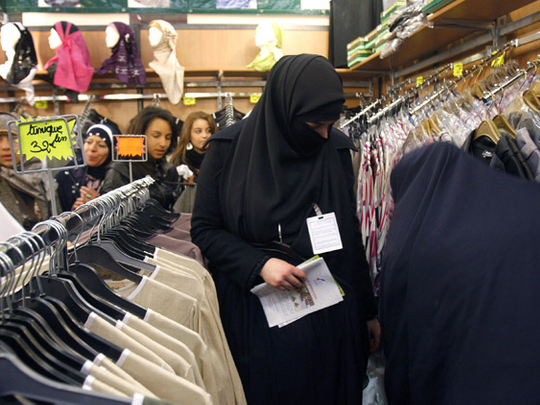
In the UAE a woman can choose what she wants to wear. It is common to see women walking together, going out shopping or relaxing in a coffee shop, wearing a variety of different clothing. Some might be wearing jeans and T-shirts, and while many others would be wearing shaila and abaya, a few might also wear the full-face niqab. The same freedom to choose applies to men, and some nationals wear national dress, some wear western clothing, and some mix and match their dishdashas with baseball caps.
This mutual tolerance of others' choices on how they lead their lives is an important part of life in the Emirates. The country is an Arab and Muslim society, with strong Gulf traditions, but remains able to cope with a wide variety of people's lifestyle choices. There is no law imposing a lifestyle or dress code on anyone, other than a perfectly normal ban on indecent dress, which is defined more modestly than in some other countries but still manages to allow a very wide range of choice.
This spirit of tolerance mixed with awareness of tradition and culture allows everyone to manage their own affairs without harming anyone else in society. But this perception is not shared by some countries in Europe, where laws are in the process of being passed banning the niqab. Belgium voted in favour of a ban earlier this year, and this week the French National Assembly voted to ban the wearing of veils that completely cover the face.
This legislation against a particular style of clothing is a confused reaction by liberal Europe against what it sees as the fundamentalist and radical minority strand of Islam. The problem is that is it the wrong reaction. Such bans hit at the easy and very visible target of a very small minority (only 1,900 women wear the niqab in France out of five million French Muslims), whereas government action should focus against the dangerous extremists, like the imams preaching intolerance and violence, or the very small number of would-be terrorists, such as those who planned the Madrid or London bombings.
The French and Belgian governments have fallen into the trap of confusing the outward signs of faith with the minority of dangerous radicals. The French government has taken the view that "hiding your face from your neighbors is a violation of French values", as said on Tuesday by Justice Minister Michele Alliot-Marie, who added that life in the French Republic "is carried out with a bare face", and that this was a "question of dignity, equality and transparency".
The French bill has been attacked by many Muslim groups, which argue that it is a thinly disguised attack on Islam in general, and designed to stir up confrontation. They take heart from many human-rights lawyers who argue that the bill would violate the French Constitution.
The vote in the French parliament follows a similar vote in Belgium, and a long-running debate in Britain. The threat that this debate poses was summarised by Professsor Kecia Ali of Boston University, who was quoted this week by Stephen Prothero on CNN's Belief Blog as saying that the "current European fixation on Muslim women's clothing" is not "a systematic push for gender equality" but "a symbolic statement" that "plays into an us-versus-them mentality with brutal real-world consequences". She added that the current furore "distracts from real issues of class injustice, racial oppression, and continued discrimination and violence against women, Muslim and non-Muslim".
Britain's debate on the niqab has widened into a much bigger discussion of how the Muslim minority should fit into Britain's traditions. It was triggered in 2006 when Jack Straw, then leader of Britain's House of Commons and former Home Secretary, wrote in his constituency newspaper, the Lancashire Telegraph, that he requested (but did not insist) that women constituents wearing the niqab remove it during meetings with him.
Widespread discontent
However, the outcry that followed his remarks did not come from the Muslim women of Blackburn, but from all sorts of leaders and spokesmen of Muslim groups in Britain. This was taken up by Adel Darwish, writing in MidEastNews, when he challenged the framework of this debate by asking how these leaders thought they had the right to speak for all Muslims.
He argued that the right forum for social and political dialogue in Britain was within its elected framework, and he welcomed Straw's initiation of this dialogue, with the hope that it would "free the silent majority of British Muslims from the intimidation of the vocal and loud radical minority and give them the opportunity to express themselves freely away from boisterous shouting of an unelected minority consisting of demagogues who seek a clash between Muslims and non-Muslims, or mercenaries getting rich through foreign funds financing fictitious Islamic cultural activities".
There is an important debate within Islam about how Muslims should live. There is also a debate about how Europe's Muslim communities live and work within the European totality, but none of these discussions are helped by bans on styles of clothing. The discussion needs a much wider focus, incorporating all sides in a tolerant manner.







